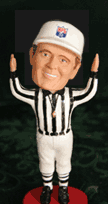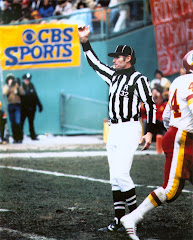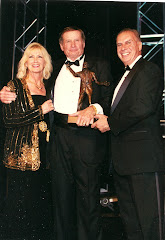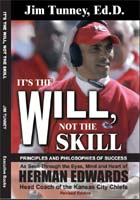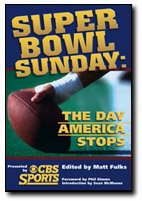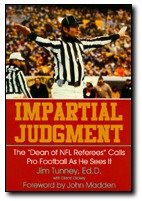After Further Review … As a kid you couldn’t get me off the playground until after dark. Well, there was one exception. If 6:00pm (dinner time at our house) occurred before it got dark, I had to be home. Mom was in charge. Dad was usually on my side, except went I went against “the rules.” I grew up on playgrounds, fields, stadiums, and have always felt very much at home there.
Dad helped nurture my feelings of the comfortableness of fields, courts and stadiums; and through sports, taught me a lot about people and relationships. Dad was sitting in the stands at one of my high school baseball games when I happened to say a word (it was friendly) to an opposing first basemen, I lost my concentration and was “picked off” – “Out,” said the umpire.
“Don’t talk to your opponents during a game,” my Dad scolded. “It’s ok to be pleasant, friendly, and sportsmanlike, but games are not for conversation.” Dad made his point. Never happened again. Which brings me to today’s athletes who “trash talk” to – or at - opponents.
As a referee on the NFL field for 31 years, I heard it all too often. With my father’s message ringing in my ears (it still does even today), I always tried to stop, curtail, reduce trash talking between opponents. To me, it adds NO value to the game. Yet, in today’s sports world, especially at the professional level, it happens on a regular basis.
Recently watching a sports talk show, one of the panelists said, “Trash talking helps the game.” The panelist went on to say that he “wished women in the WNBA would do more of it.” How does it help the game? Does it make your opponent play better? If so, that’s not a good thing. On the other hand, does it make an opponent play worse?
Then again, how far does one take trash talking? Are there boundaries? Racial slurs ok? Many of them start fights. Is fisticuffs part of sports? In hockey – well, don’t get me started.
Do you go to a game to see/hear players trash talk?
Most dictionaries describe the word “trash” as “junk,” “garbage,” and “litter;” or to “attack” or “criticize severely.” What value does that add to any game? Further, what example does it send to Little Leaguers, high school or college players who see their “heroes (?)” trash talking?
Will (does) trash talk help or hurt the game?
Friday, January 29, 2010
Friday, January 15, 2010
“Coming up next … Helping Your Teammates” - #264 – January 18, 2010
After Further Review … “I want to apologize to the National Basketball Association if I ticked anybody off by us having fun,” Gilbert Arenas, star player of the Washington Wizards, is reported to have said following his actions in front of the crowd prior a game in Philadelphia. Arenas purportedly held both hands in the shape of guns with his thumbs locked, and then faked shooting at his teammates. This incident followed the report that he had brought a firearm into the Wizards locker room and brandished the weapon towards a teammate in a “playful way.” Arenas compounded this by posting it on his Twitter account.
Not only is Arenas’ action detestable in this day and age of barbarous gun use, but please note that the Washington Wizards recently changed its name from the Washington Bullets because of the violent connotation in today’s world. Arenas brought a real weapon into a professional sports locker room? As a joke? Where did Arenas leave his common sense, his understanding of the law, let alone his disregard of NBA rules? Not only has Commissioner David Stern suspended Arenas, but the NBA has launched an investigation, along with the Office of the United States Attorney in the District of Columbia, and the Metropolitan Police Department. Arenas has been charged with a felony.
Ironic; since this is the day of celebration for Dr. Martin Luther King, Jr., a chief spokesman for non-violence. In addition to apologizing to the NBA, Arenas needs to make amends to Dr. King’s memory as well as Arenas’ family and fans.
Do today’s pro athletes carry guns? Who? How many? Why? Well, as one person close to pro athletes said, “If the brothers know you’re packing, they’ll leave you alone.” Why do high-profile athletes associate with, hang around, and/or visit places where bad influences gather? Did we not learn anything from Michael Vick? Or Plaxico Burress? Or Jayson Williams?
“It’s sad,” said one of Arenas’ Wizards teammates, “We’re a family and it hurts.” Sir, if you’re a family, step up and help a teammate, when his common sense falters. Where was Arenas’ agent with advice/concern for avoiding these situations? How about Arenas’ family; did they not see this coming? And what does Arenas’ “star status” say to young fans that admire his skills? While fans often want to emulate what their “heroes” do, they need to observe their behavior off the court as well!
Will you be watchful of your family and teammates who may lose their way?
Not only is Arenas’ action detestable in this day and age of barbarous gun use, but please note that the Washington Wizards recently changed its name from the Washington Bullets because of the violent connotation in today’s world. Arenas brought a real weapon into a professional sports locker room? As a joke? Where did Arenas leave his common sense, his understanding of the law, let alone his disregard of NBA rules? Not only has Commissioner David Stern suspended Arenas, but the NBA has launched an investigation, along with the Office of the United States Attorney in the District of Columbia, and the Metropolitan Police Department. Arenas has been charged with a felony.
Ironic; since this is the day of celebration for Dr. Martin Luther King, Jr., a chief spokesman for non-violence. In addition to apologizing to the NBA, Arenas needs to make amends to Dr. King’s memory as well as Arenas’ family and fans.
Do today’s pro athletes carry guns? Who? How many? Why? Well, as one person close to pro athletes said, “If the brothers know you’re packing, they’ll leave you alone.” Why do high-profile athletes associate with, hang around, and/or visit places where bad influences gather? Did we not learn anything from Michael Vick? Or Plaxico Burress? Or Jayson Williams?
“It’s sad,” said one of Arenas’ Wizards teammates, “We’re a family and it hurts.” Sir, if you’re a family, step up and help a teammate, when his common sense falters. Where was Arenas’ agent with advice/concern for avoiding these situations? How about Arenas’ family; did they not see this coming? And what does Arenas’ “star status” say to young fans that admire his skills? While fans often want to emulate what their “heroes” do, they need to observe their behavior off the court as well!
Will you be watchful of your family and teammates who may lose their way?
Monday, January 11, 2010
Tunney Side of Sports; “Coming up next … Coach vs. Teacher” - #263 – January 11, 2010
After Further Review … “Nothing is ever so bad it can’t be made worse by firing the Coach,” wrote former syndicated sports columnist Jim Murray. Murray, arguably the greatest ever, was able to succinctly capture the essence of a sports story with humor and satire. What brings the Murray quote to mind is that this is the time of year when football coaches are “separated” from their jobs.
So, what IS the role of a coach? At the Little League and high school levels, a coach’s focus needs to be on TEACHING. T.E.A.M.s certainly should “play to win the game,” as Coach Herm Edwards says in my book “It’s the Will, Not the Skill.” However, teaching must come first. My belief is: a coach helps you become a better player and a better person. Coaching and teaching are synonymous.
As a former high school teacher and administrator, I believe that IS the role of a teacher – to help students become better people as well as better learners. What if a teacher looked at students as “players;” e.g. some are quarterbacks, some are linemen, some are wide receivers – each student having different strengths? Classroom teachers, then, do the same thing as coaches do on the field, they develop each student’s special talents.
Should college and professional coaches be teachers as well? One former NFL coach told me, “In the NFL, you don’t get paid to coach/teach; you get paid to win.” Can a pro coach do both – teach and win? I have known NFL coaches (with whom I had the pleasure of being on the field) who did both -- e.g. Lombardi, Landry, Walsh, Shula, Madden and Edwards. Players always spoke highly of their learning experiences both on and off the field, and appreciated the efforts their coaches made in helping them become “better people, as well as better players.”
Good coaches do that. However, teaching too often takes a back seat to the pressure of winning. College coaching, for example, has become a race to be number 1. Indeed, some college coaches let their desire (ego?) to win get in the way of what their real purpose must be. However, given the choice, good coaches place teaching ahead of winning-at-all-costs. Unfortunately, economics drives that winning-at-all-costs attitude. Too bad!
Will you support those teachers/coaches who strive to help their students/players become the best they can be both on and off the field?
So, what IS the role of a coach? At the Little League and high school levels, a coach’s focus needs to be on TEACHING. T.E.A.M.s certainly should “play to win the game,” as Coach Herm Edwards says in my book “It’s the Will, Not the Skill.” However, teaching must come first. My belief is: a coach helps you become a better player and a better person. Coaching and teaching are synonymous.
As a former high school teacher and administrator, I believe that IS the role of a teacher – to help students become better people as well as better learners. What if a teacher looked at students as “players;” e.g. some are quarterbacks, some are linemen, some are wide receivers – each student having different strengths? Classroom teachers, then, do the same thing as coaches do on the field, they develop each student’s special talents.
Should college and professional coaches be teachers as well? One former NFL coach told me, “In the NFL, you don’t get paid to coach/teach; you get paid to win.” Can a pro coach do both – teach and win? I have known NFL coaches (with whom I had the pleasure of being on the field) who did both -- e.g. Lombardi, Landry, Walsh, Shula, Madden and Edwards. Players always spoke highly of their learning experiences both on and off the field, and appreciated the efforts their coaches made in helping them become “better people, as well as better players.”
Good coaches do that. However, teaching too often takes a back seat to the pressure of winning. College coaching, for example, has become a race to be number 1. Indeed, some college coaches let their desire (ego?) to win get in the way of what their real purpose must be. However, given the choice, good coaches place teaching ahead of winning-at-all-costs. Unfortunately, economics drives that winning-at-all-costs attitude. Too bad!
Will you support those teachers/coaches who strive to help their students/players become the best they can be both on and off the field?
Subscribe to:
Posts (Atom)



